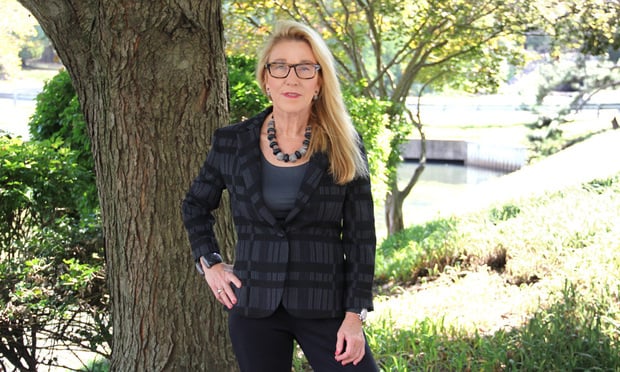Litigator Berezofsky Not Forced to Share Flint Fees With Former Partner
A judge confirmed an award finding that Esther Berezofsky was not required to include former partner Mark Cuker in litigation over water contamination in Flint, Michigan.
February 20, 2019 at 06:02 PM
4 minute read
 Esther Berezofsky.
Esther Berezofsky.
A former name partner at Philadelphia-area trial firm Williams Cuker Berezofsky will not be required to share fees from a class action over water contamination in Flint, Michigan, with her former partners.
In an order entered Tuesday, U.S. District Judge Mark Kearney of the Eastern District of Pennsylvania affirmed an arbitration award from last year, which said litigator Esther Berezofsky was not obligated by a dissolution agreement to include her former partner, Mark Cuker, in the Flint litigation.
Cuker and Berezofsky were partners at Williams Cuker Berezofsky from 2000 to 2017, Cuker's complaint said, along with Gerald Williams. The firm broke up in September 2017, and each of its name partners either affiliated with a new firm or founded one.
Cuker alleged that Berezofsky excluded Cuker from the Flint class action when the dissolution agreement said they would serve as co-counsel in that litigation. He had also alleged that Berezofsky breached the dissolution agreement with regard to disbursements from the dissolved firm's operating account.
In an opinion Nov. 19, the arbitration panel said Berezofsky was not required to share fees from the Flint matter, Kearney's opinion said. Cuker asked for reconsideration of that decision, but it became final in January, and Kearney confirmed it Tuesday.
The arbitration panel rejected, among other arguments, Cuker's intentional interference with contractual relations claim, Kearney's opinion said, because “while Ms. Berezofsky had an obligation not to interfere with Mr. Cuker's efforts to obtain a leadership role in the consolidated class action in the Flint litigation, she did not have an obligation to assist him in gaining a leadership role.”
As to the firm's dissolution, the opinion said, there were eight categories of bills considered, and the arbitration panel decided some should be paid by Berezofsky, some by both Cuker and Berzofsky, and some by the partnership. The parties in arbitration agreed to those terms, the opinion said.
According to Cuker's complaint, Williams Cuker Berezofsky exhausted its credit line in January 2017 and lacked adequate cash flow to continue operating without employee layoffs or partner contributions. Cuker and Williams contributed $300,000 between the two of them, but Berezofsky did not, the complaint said. Instead, Cuker alleged, Berezofsky continued to take a $4,000 weekly draw, for a total of about $80,000 during that period.
Ultimately, the partners chose to dissolve the firm and executed a dissolution agreement in September. That agreement included provisions for the amounts each partner should be paid, the complaint said, based on their contributions, which was over $181,000 for Williams, over $143,000 for Cuker, and just under $8,800 for Berezofsky.
Cuker has alleged that Berezofsky violated the dissolution agreement by refusing to authorize Cuker's and Williams' disbursements. Cuker also alleged that Berezofsky misappropriated fees from medical device settlement claims that came in after the dissolution.
The three-arbitrator panel consisted of lawyer Angelo Scaricamazza, retired Pennsylvania Superior Court Judge Richard Klein and retired Philadelphia Court of Common Pleas Judge Sandra Mazer Moss.
Attorney Carlo Scaramella, who represented Berezofsky, said in a written statement that Tuesday's order was a “complete vindication.”
“It is our belief that one cannot read Judge Kearney's opinion confirming the arbitration awards and those awards themselves without coming away with the firm belief that Cuker's allegations, some of which may be viewed as inflammatory, fundamentally lacked merit and were utterly defeated,” the statement said.
Cuker, who represented himself in the case,did not immediately return a call seeking comment Wednesday.
Read More
This content has been archived. It is available through our partners, LexisNexis® and Bloomberg Law.
To view this content, please continue to their sites.
Not a Lexis Subscriber?
Subscribe Now
Not a Bloomberg Law Subscriber?
Subscribe Now
NOT FOR REPRINT
© 2025 ALM Global, LLC, All Rights Reserved. Request academic re-use from www.copyright.com. All other uses, submit a request to [email protected]. For more information visit Asset & Logo Licensing.
You Might Like
View All
Commonwealth Court Overturns Award of Damages Assessed Against Landlord on Claims of Unlawful Discrimination
6 minute read

Trending Stories
- 1Many LA County Law Firms Remain Open, Mobilize to Support Affected Employees Amid Historic Firestorm
- 2Stevens & Lee Names New Delaware Shareholder
- 3U.S. Supreme Court Denies Trump Effort to Halt Sentencing
- 4From CLO to President: Kevin Boon Takes the Helm at Mysten Labs
- 5How Law Schools Fared on California's July 2024 Bar Exam
Who Got The Work
Michael G. Bongiorno, Andrew Scott Dulberg and Elizabeth E. Driscoll from Wilmer Cutler Pickering Hale and Dorr have stepped in to represent Symbotic Inc., an A.I.-enabled technology platform that focuses on increasing supply chain efficiency, and other defendants in a pending shareholder derivative lawsuit. The case, filed Oct. 2 in Massachusetts District Court by the Brown Law Firm on behalf of Stephen Austen, accuses certain officers and directors of misleading investors in regard to Symbotic's potential for margin growth by failing to disclose that the company was not equipped to timely deploy its systems or manage expenses through project delays. The case, assigned to U.S. District Judge Nathaniel M. Gorton, is 1:24-cv-12522, Austen v. Cohen et al.
Who Got The Work
Edmund Polubinski and Marie Killmond of Davis Polk & Wardwell have entered appearances for data platform software development company MongoDB and other defendants in a pending shareholder derivative lawsuit. The action, filed Oct. 7 in New York Southern District Court by the Brown Law Firm, accuses the company's directors and/or officers of falsely expressing confidence in the company’s restructuring of its sales incentive plan and downplaying the severity of decreases in its upfront commitments. The case is 1:24-cv-07594, Roy v. Ittycheria et al.
Who Got The Work
Amy O. Bruchs and Kurt F. Ellison of Michael Best & Friedrich have entered appearances for Epic Systems Corp. in a pending employment discrimination lawsuit. The suit was filed Sept. 7 in Wisconsin Western District Court by Levine Eisberner LLC and Siri & Glimstad on behalf of a project manager who claims that he was wrongfully terminated after applying for a religious exemption to the defendant's COVID-19 vaccine mandate. The case, assigned to U.S. Magistrate Judge Anita Marie Boor, is 3:24-cv-00630, Secker, Nathan v. Epic Systems Corporation.
Who Got The Work
David X. Sullivan, Thomas J. Finn and Gregory A. Hall from McCarter & English have entered appearances for Sunrun Installation Services in a pending civil rights lawsuit. The complaint was filed Sept. 4 in Connecticut District Court by attorney Robert M. Berke on behalf of former employee George Edward Steins, who was arrested and charged with employing an unregistered home improvement salesperson. The complaint alleges that had Sunrun informed the Connecticut Department of Consumer Protection that the plaintiff's employment had ended in 2017 and that he no longer held Sunrun's home improvement contractor license, he would not have been hit with charges, which were dismissed in May 2024. The case, assigned to U.S. District Judge Jeffrey A. Meyer, is 3:24-cv-01423, Steins v. Sunrun, Inc. et al.
Who Got The Work
Greenberg Traurig shareholder Joshua L. Raskin has entered an appearance for boohoo.com UK Ltd. in a pending patent infringement lawsuit. The suit, filed Sept. 3 in Texas Eastern District Court by Rozier Hardt McDonough on behalf of Alto Dynamics, asserts five patents related to an online shopping platform. The case, assigned to U.S. District Judge Rodney Gilstrap, is 2:24-cv-00719, Alto Dynamics, LLC v. boohoo.com UK Limited.
Featured Firms
Law Offices of Gary Martin Hays & Associates, P.C.
(470) 294-1674
Law Offices of Mark E. Salomone
(857) 444-6468
Smith & Hassler
(713) 739-1250






